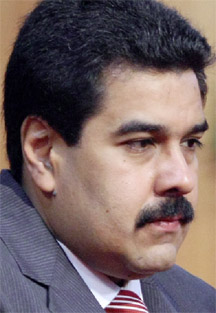Most polls show that Venezuela’s government candidate Nicolás Maduro is likely to win today’s elections thanks to an unfair election process in which the government controls an overwhelming share of TV time, but — even if he wins — Maduro’s future is gloomy.
If most polls are right and Maduro wins despite a significant narrowing of his advantage over opposition candidate Henrique Capriles in recent days, a lot will depend on his margin of victory, and on whether Capriles concedes as readily as he and other opposition leaders have done in the past. It may not happen quite that way this time.
Judging from what I’m told by well-placed Venezuelans, there are five major scenarios of what may happen after today’s vote to elect late President Hugo Chávez’s successor. Here they are, in no particular order:
 First scenario: A clear Maduro victory by more than 10 percentage points, and six years of rule by Chávez’s designated heir.
First scenario: A clear Maduro victory by more than 10 percentage points, and six years of rule by Chávez’s designated heir.
Maduro’s conclusive victory leaves Capriles with no option but to concede, and the defeated candidate’s complaints about a tainted election process — in which the government not only controlled most of the media, but also bought votes and intimidated opposition voters — sound like sour grapes.
Globovision, the last anti-Chávez television network, is silenced after its recent sale to government cronies. Venezuela becomes an elected dictatorship, with no opposition media.
Second scenario: A clear Maduro victory, followed by chaos down the road.
Maduro wins by 10 per cent or more, but his government implodes over the next two years because of a combination of Venezuela’s skyrocketing inflation, which is the highest in Latin America, its inability to keep state subsidies amid stagnant oil prices, and internal divisions within the Chavista corruptocracy.
There are riots on the streets, and the military refuses to fire on protesters despite current Defence Minister Diego Molero’s recent statement that Venezuela’s National Bolivarian Armed Forces are “anti-imperialist, socialist and Chavistas.”
Government-backed para-military groups attack protesters, drawing an international outcry and forcing the government to call early elections.

Third scenario: A not-so-clear Maduro victory, followed by a temporary calm before the storm. Maduro wins by 5 per cent of the vote, and Capriles remains silent or stops short of conceding.
Cuba, which micro-manages Maduro’s government and wants stability in Venezuela at all costs to preserve Venezuela’s oil subsidies, recommends Maduro to resume talks with the US State Department to normalize relations.
But as Venezuela’s economy collapses, Maduro needs a scapegoat, and resurrects his conspiracy theories that the US government inoculated Chávez with cancer, and that former US diplomats are trying to kill him. Venezuela enters a period of instability, followed by chaos, and within two years Maduro has to call for early elections.
Fourth scenario: A questionable Maduro victory by 2 per cent, which Capriles immediately denounces as fraudulent.
Maduro, who doesn’t have Chávez’s wits nor folksy personality, declares victory today, but the election results are much closer than expected. Opposition students take to the streets to defend what they see as a stolen election.
The fact that the government did not allow the Organization of American States or European Union electoral observers — only sympathetic UNASUR visitors — casts further doubts about the election results.
The Maduro government cracks down on protesters, but the scenes of violence start a process of gradual loss of legitimacy of the Maduro government at home and abroad, which accelerates the regime’s implosion.
Fifth scenario: Capriles wins by more than 3 percentage points, and the Maduro government has little choice but to concede. Much like happened in Nicaragua’s 1990 elections, when the opposition defeated the Sandinista regime despite the government’s huge advantage in the polls, a victorious Capriles takes office.
But faced with a pro-Chávez Congress, and virtually all other government institutions dominated by Chavistas, Capriles has to form a de-facto coalition government. In addition, he has to take unpopular austerity measures, for which he will need some degree of Chavista support.
My opinion: I wouldn’t be surprised if we see the third or fourth scenario in Venezuela — a clear Maduro victory with a period of calm before the storm, or a not-so-clear Maduro victory that will mark the beginning of the end of the Chávez-era populist fiesta.
Either way, if he wins, Maduro faces a grim future. He will inherit a crumbling economy, courtesy of a Chávez legacy that has left Venezuela more oil-dependent, less industrialized and more poorly educated than ever despite having benefited from the biggest oil export bonanza in recent memory.
© The Miami Herald, 2013. Distributed by Knight Ridder/Tribune Media Services.




